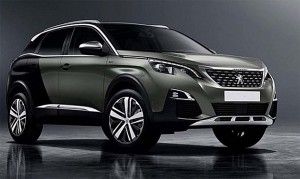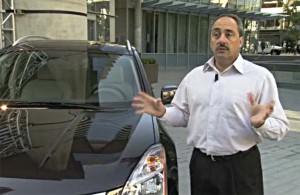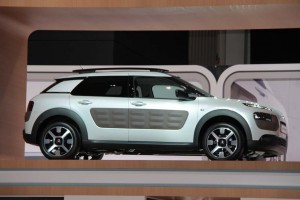
While new Peugeot models, such as this 3008 crossover, would work for North America, PSA will develop unique U.S. products.
On Thursday, the U.S. Commerce Dept. will hold hearings in Washington, D.C. to decide if, as President Donald Trump has suggested, imported automobiles pose a threat to national security. If so, the White House could follow up with new tariffs of up to 25% on those vehicles.
That’s on top of the previously enacted tariffs on steel and aluminum that have already begun to drive up production costs for domestic manufacturers. And the industry’s response has been fierce in its opposition to the Trump administration’s proposal.
But as much as the potential tariff hike has complicated matters for existing manufacturers, it is raising even more challenges for potential new entrants to the U.S. market, including PSA, the French parent of the Peugeot, Citroen, Opel and Vauxhall brands, which is in the midst of developing a strategy to return to North America for the first time in more than a quarter century.
“I’m crossing my fingers” and hoping the tariffs aren’t implemented, Larry Dominique, the veteran auto executive who now serves as the U.S. president and CEO for PSA, said during a meeting with reporters at the Detroit Automotive Press Association on Tuesday. “I’m hoping by the time we start importing vehicles this won’t be an issue.”
Next month will mark the 27thyear since the Peugeot brand officially left the United States, the victim of declining sales and deep losses. Two years ago, PSA said it wanted to stage a comeback to North America, though Dominique, the then-new chief executive for the U.S. and Canada, cautioned that he was going to move slowly and cautiously, developing what he likes to call a “50-year plan.”
The first step came with the launch of a small car-sharing service based near LAX, the big Los Angeles airport. The company is pushing into mobility services that will eventually include car and ride-sharing as well as the ability to schedule and pay for multimodal travel through a single smartphone app, dubbed Free2Move.
(PSA picks Atlanta as North American headquarters. Click Here for the story.)
Initially, the vehicles used in the car-sharing service are supplied by their owners, giving them discounted airport parking and the possibility of sharing revenues while their vehicles are rented out. The next step will come “in a couple years,” Dominique said, as PSA begins importing vehicles from Europe to test out through the sharing service. The final phase of the plan will see the French automaker re-establish a retail network to compete directly in the North American new vehicle market.
During his appearance at the APA luncheon, Dominique was coy about key details of the re-launch. Among other things, he wouldn’t say what brand PSA will use when it returns, though it’s widely expected to be either Peugeot or Citroen. The first products will specifically be designed to meet the “tastes” of U.S. buyers, the CEO said, as well as to comply with American regulations. With California one of PSA’s key target markets, at least some of the vehicles will be electrified. PSA itself has said it plans to have battery-based powertrain options for all of its products within the next five years.
One thing Dominique did stress was his desire to create a very different sort of retail network from what’s in place today. And there’s good reason considering that without manufacturer support, most dealers would actually lose money on every vehicle they sell. Industry-wide, about 32% of the sticker price of a new car, truck or crossover goes to marketing costs, which includes incentives and retailing.
“We need to deliver a retail model that allows our partners and ourselves to make money selling cars,” he said, adding that one of the challenges will be to work around the myriad – and often highly restrictive – franchise laws in place around the country. Only five steps allow direct factory sales, though that includes California, the largest single vehicle market in the U.S.
(Click Here for details about GM completing the sale of Opel/Vauxhall to PSA Group.)
Initially, the PSA roll-out will be slow and cautious as it tests the waters to see if it can attract the right sort of buyers. It’s not yet determined, in fact, if the company will ultimately target all 50 states or focus on just the key markets, like California, Texas, Florida and New York, that represent a disproportionate share of U.S. car sales.
And then there’s the threat of incentives. Dominique said he is optimistic things will work out in a positive way for the industry. Then again, in a worst-case scenario, he said, “I could launch in Canada,” and hold off on a return to the U.S.
Another possibility would be to sidestep the tariffs, possibly by building a U.S. assembly plant, like the one Volvo just last month opened in Charleston, South Carolina. But Dominique is reluctant to “industrialize,” a billion-dollar process, until it is clear there would be a market for vehicles built at a North American plant.
How soon the PSA retail network will debut is another unanswered question, though the CEO hinted the necessary products are still “a few years” away. Even if the White House does decide to expand its global trade war, that gives time for things to be resolved. In fact, there’s some talk about eliminating automotive tariffs entirely between the U.S. and Europe.
(PSA lays out three-stage plan for return to the United States. Click Here for the story.)
In the meantime, PSA’s North American team will continue developing its comeback strategy out of its new headquarters in Atlanta. Dominique expects to have between 50 and 80 employees in place there by year-end, with a bigger ramp-up to follow as the necessary pieces begin to fall into place.


